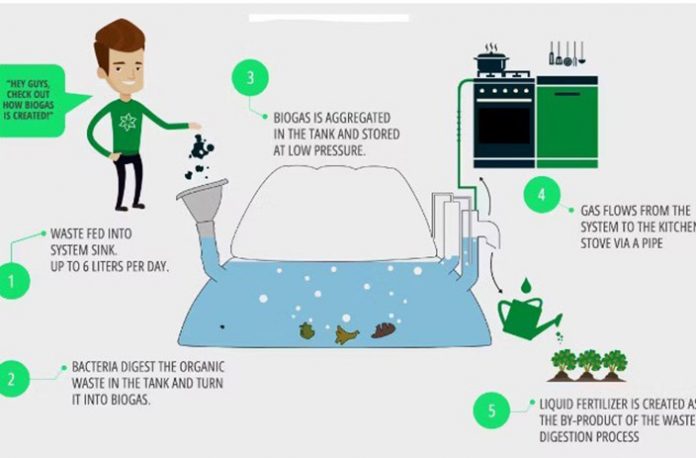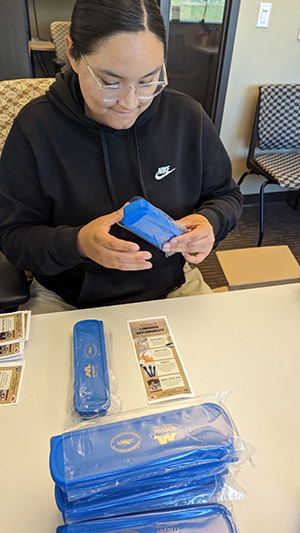
The U.S. Department of Agriculture recently awarded a $172,000 grant to the Confederated Tribes of the Umatilla Indian Reservation’s (CTUIR) Department of Natural Resources for a community food waste reduction project.
The campaign titled “Nixyáawii, Awkú Čáwpam Áḱaatta!” or “Nixyáawii, Don’t Throw it Away!” will initiate and expand efforts to improve waste management and food waste diversion from CTUIR facilities while engaging the tribal community on food waste management issues.
CTUIR Climate Adaption Planner Colleen Sanders said beginning this spring the tribe’s First Foods Policy Program (FFPP) will use an anaerobic digester around the Mission Community Center, especially the Nixyáawii Longhouse, as a waste capture mechanism.
FFPP will work with Biowaste Technologies, a CTUIR-owned and -operated company headed by Dearcie Abraham, to understand the types and volume of food waste created by the Mission/Nixyáawii community, and to implement a demonstration of one type of food waste management approach known as anaerobic digestion. Anaerobic digestion uses microorganisms to break down biodegradable material in the absence of oxygen and reduces greenhouse gases.
“Biowaste Technologies has a goal to make a tangible difference in the CTUIR community through environmental health and safety while tackling food insecurity,” Abraham said.
Sanders said the project contains three primary goals:
- Work with the Nixyáawii Longhouse, tribal community and other smaller CTUIR facilities to understand the types and volumes of food waste created and create a report.
- Select and establish a small anaerobic digester that is designed to take food waste, digest it within a sealed environment and use the methane to cook and grill as part of the project’s community engagement.
- Develop and offer educational opportunities for the tribal community to build capacity and understanding around not only food waste but other opportunities to reduce materials being sent to landfills.

“When food and other formerly living materials like yard waste are thrown in a landfill, they are covered by other nonbiodegradable garbage to create an environment without oxygen,” Sanders said. “When it decomposes in an environment without oxygen, it transforms into methane, a very potent greenhouse gas. Because of this, preventing the creation of methane by keeping food and yard waste from being disposed of in landfills can effectively reduce carbon emissions.”
Sanders added the project also consists of using the anaerobic digester to potentially generate renewable energy, as well as creating solid and liquid compost that can be used in local gardens.
The CTUIR are a place-based cultures, and seasonal celebrations of culturally important First Foods include food preparation, feasting and cleaning, typically hosted at the Longhouse for the tribal community’s benefit. Food waste is generated as part of these events, therefore improving food waste recapture is a CTUIR priority.
FFPP Manager Althea Huesties-Wolf said waste recapture at the Longhouse will focus on food left on plates that will no longer go into a landfill. “As a gatherer and someone who serves at the Longhouse, it is so disheartening to throw plate scraps of roots, berries, salmon and deer that individuals do not finish eating into a garbage can. The digester will allow Colleen (Sanders) and Dearcie (Abraham) to work with cooks on new methods for managing food waste at the Longhouse….If it is feasible at the Longhouse, it could be feasible at homes and businesses.”
She added the CTUIR needs to know how much food waste is generated to understand how many digesters could be used in the community.
“We imagine this project will have a snowball effect, by making people aware of their food waste,” Huesties-Wolf said. “If the tribe is serious about addressing climate change, we must change our mindset as members of this community.”
In addition to the USDA’s $172,521, the CTUIR will appropriate $57,508 in staff time dedicated to the two-year project, which the Department of Children and Family Services’ Family Engagement Program will support. Sanders said she hopes the project will continue after the two-year grant cycle, but that would rely on the tribal community’s support and enthusiasm.
The project is supported in part by the USDA’s intramural research program, National Institute of Food and Agriculture and the Office of Urban Agriculture and Innovative Production.










